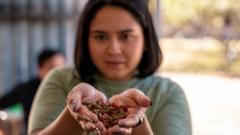The Trump administration is intensifying its campaign against Cuba's medical missions, implementing visa restrictions aimed at foreign officials in countries that participate in this program. As a result, this could significantly undermine Cuba's reach in global health diplomacy.**
**Trump Targets Cuban Medical Missions Amid Visas Crackdown**

**Trump Targets Cuban Medical Missions Amid Visas Crackdown**
**Efforts to Restrict Medical Diplomacy Could Impact Global Health Services.**
In a significant shift in U.S. policy, the Trump administration has initiated measures to undermine one of Cuba's most notable exports: its healthcare professionals deployed around the world. This initiative begins at a critical juncture, where former Cuban doctors like Ramona Matos, who have sought refuge in the U.S., are rallying against the exploitation within the Cuban medical mission system.
For decades, Cuba has utilized its healthcare workers strategically, sending thousands to serve in remote and underserved areas across various countries. These missions, while beneficial to those receiving care, are often criticized as a means for Havana to project a benevolent image internationally while financially exploiting its medical professionals, who receive only a fraction of the payment made by these countries.
Upon assuming the presidency, Trump set his sights on recalibrating U.S.-Cuba relations, tightening restrictions that might negatively impact not only Havana's economic interests but also its public diplomacy achievements. This includes implementing a policy that denies U.S. visas to foreign officials in countries that compensate Cuba for their medical assistance.
The ramifications of these visa revocations could resonate deeply within the realm of global health. As countries that benefit from Cuban medical professionals find it increasingly difficult to collaborate, millions may lose access to critical healthcare services. The ripple effects could not only hinder healthcare access in places that rely on Cuban doctors but also reshape the global narrative on medical assistance, humanitarianism, and international cooperation.
Matos, who transitioned from a medical professional in Cuba to a factory worker in South Florida, serves as a personal testament to the plight of many involved in Cuba's medical mission program. Her experiences underscore the complex interplay of politics, healthcare, and global diplomacy, emphasizing that the repercussions of U.S. policy are felt not only in geopolitics but by individuals caught in the crossfire. The future of Cuba's medical diplomacy hangs in the balance as the administration’s tightening grip may herald an era of decreased support for those in need worldwide.
For decades, Cuba has utilized its healthcare workers strategically, sending thousands to serve in remote and underserved areas across various countries. These missions, while beneficial to those receiving care, are often criticized as a means for Havana to project a benevolent image internationally while financially exploiting its medical professionals, who receive only a fraction of the payment made by these countries.
Upon assuming the presidency, Trump set his sights on recalibrating U.S.-Cuba relations, tightening restrictions that might negatively impact not only Havana's economic interests but also its public diplomacy achievements. This includes implementing a policy that denies U.S. visas to foreign officials in countries that compensate Cuba for their medical assistance.
The ramifications of these visa revocations could resonate deeply within the realm of global health. As countries that benefit from Cuban medical professionals find it increasingly difficult to collaborate, millions may lose access to critical healthcare services. The ripple effects could not only hinder healthcare access in places that rely on Cuban doctors but also reshape the global narrative on medical assistance, humanitarianism, and international cooperation.
Matos, who transitioned from a medical professional in Cuba to a factory worker in South Florida, serves as a personal testament to the plight of many involved in Cuba's medical mission program. Her experiences underscore the complex interplay of politics, healthcare, and global diplomacy, emphasizing that the repercussions of U.S. policy are felt not only in geopolitics but by individuals caught in the crossfire. The future of Cuba's medical diplomacy hangs in the balance as the administration’s tightening grip may herald an era of decreased support for those in need worldwide.






















